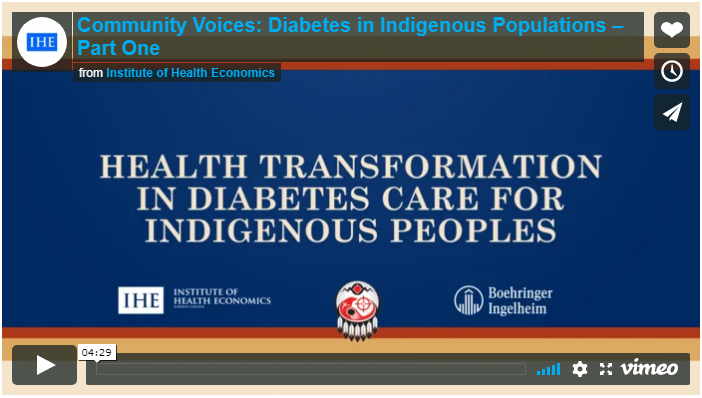Community Voices: Diabetes in Indigenous Populations
Community Voices: Diabetes in Indigenous Populations is a video project produced by the Institute of Health Economics in Alberta Canada and support by Boehringer-Ingelheim Canada. This video aims to highlight Indigenous perspectives on health, and promote shared learning for a variety of stakeholders within the context of health, well-being, and health care in Canada.
New videos from the series will be added regularly to the Institute for Health Economics website here, and will highlight voices from Indigenous communities describing current issues of concern, and aspirations for the future.
Community Voices: Diabetes in Indigenous Populations – Part One
Description
The video above captures voices from the Assembly of First Nations Health Transformation Summit, which took place February 13-14, 2018.
A special thank you to Dr. Angela Mashford Pringle, Assistant Professor, University of Toronto, and Associate Director, Waakebiness-Bryce Institute for Indigenous Health; Carol Hopkins, Executive Director, Thunderbird Partnership Foundation; Regional Chief Isadore Day, Assembly of First Nations; and the Assembly of First Nations for supporting the development of this video.
Background
The Institute of Health Economics hosted a policy roundtable Diabetes Care and Management in Indigenous Populations in Canada in the Fall of 2017. A major theme emerging from the roundtable was the importance of community engagement and leadership in the development of effective health programming, which is a key component of several current initiatives at both local and national levels. At a national level, the Assembly of First Nations Health Transformation Agenda aims to support the development of health systems led, managed, and operated by First Nations communities, for First Nations communities. At the community level, there are several successful diabetes care and management programs, including the Kahnawake Diabetes Prevention Project, Diabetes and My Nation, and the Indigenous Diabetes Health Circle, among many others, which were developed by communities to address self-identified priorities and needs.
Acknowledgements
This project was only possible through the generous contributions of many individuals across Canada, and their willingness to participate and share their perspectives, thoughts, and ideas with us, and to offer their comments and feedback on earlier versions. We thank them for their time, contributions, and seemingly limitless patience teaching us.
Project Sponsor
This project was completed with funding support, and in partnership with Boehringer Ingelheim (Canada) Ltd.















